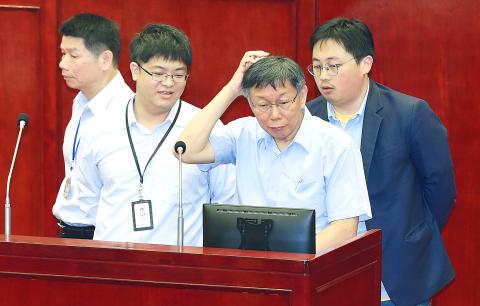The Human Rights Network for Tibet and Taiwan yesterday demanded an apology from Taipei Mayor Ko Wen-je (柯文哲) for saying that Tibetan lamas were causing trouble for the Chinese government by self-immolating.
Ko on Wednesday said at a Taipei City Government briefing on public safety that self-immolation was a “trendy” thing to do among Tibetan lamas, adding that the behavior “caused great trouble for the Chinese government.”
Self-immolation is a public safety hazard and “not a very good way to commit suicide,” he said.

Photo: Liao Chen-huei, Taipei Times
“Why would anyone choose self-immolation to take their own life? That is weird. Why self-immolation? I do not get it,” he said, laughing.
Group president Tashi Tsering yesterday said that he found Ko’s remarks to be “infuriating” and impossible to understand.
Despite being an influential political figure, Ko appears to be oblivious to the suffering of people in Tibet, Xinjiang and Hong Kong under the authoritarian rule of the Chinese Communist Party, and uninterested in learning about the truth, he said.
“He is only willing to speak for the Chinese government and only worried that people’s protests would lead to inconvenience for the government,” Tashi said, adding that the mayor should apologize for his remarks.
Tibetans have not chosen self-immolation to be trendy, but rather to stand up for people who are suffering, the group said, adding that many of them left behind a letter stating their beliefs and calling for freedom.
Ko’s remarks appeared to blame Tibetans for causing trouble while ignoring the Chinese government’s crackdowns on Tibetan religion, culture and human rights, said independent Legislator Freddy Lim (林昶佐), who is head of the Taiwan Parliamentary Group for Tibet.
Self-immolation has been the most poignant form of protest by Tibetans to safeguard their faith and dignity against the Chinese government’s relentless suppression, he said, adding that at least 159 Tibetans have self-immolated since 2002.
“Who chooses self-immolation just because it is a trendy thing to do?” Lim asked, adding that politicians should be more sympathetic.
During a question-and-answer session at the Taipei City Council yesterday, New Power Party Taipei City Councilor Lin Ying-meng (林穎孟) asked the mayor to take back his controversial remarks, which she said went against the city’s values of freedom, democracy and human rights.
Ko said that words spoken cannot be retracted, adding: “I am still not a fan of radical protests.”

SEPARATE: The MAC rebutted Beijing’s claim that Taiwan is China’s province, asserting that UN Resolution 2758 neither mentions Taiwan nor grants the PRC authority over it The “status quo” of democratic Taiwan and autocratic China not belonging to each other has long been recognized by the international community, the Mainland Affairs Council (MAC) said yesterday in its rebuttal of Beijing’s claim that Taiwan can only be represented in the UN as “Taiwan, Province of China.” Chinese Minister of Foreign Affairs Wang Yi (王毅) yesterday at a news conference of the third session at the 14th National People’s Congress said that Taiwan can only be referred to as “Taiwan, Province of China” at the UN. Taiwan is an inseparable part of Chinese territory, which is not only history but

NATIONAL SECURITY: The Chinese influencer shared multiple videos on social media in which she claimed Taiwan is a part of China and supported its annexation Freedom of speech does not allow comments by Chinese residents in Taiwan that compromise national security or social stability, the nation’s top officials said yesterday, after the National Immigration Agency (NIA) revoked the residency permit of a Chinese influencer who published videos advocating China annexing Taiwan by force. Taiwan welcomes all foreigners to settle here and make families so long as they “love the land and people of Taiwan,” Premier Cho Jung-tai (卓榮泰) told lawmakers during a plenary session at the Legislative Yuan in Taipei. The public power of the government must be asserted when necessary and the Ministry of

CROSSED A LINE: While entertainers working in China have made pro-China statements before, this time it seriously affected the nation’s security and interests, a source said The Mainland Affairs Council (MAC) late on Saturday night condemned the comments of Taiwanese entertainers who reposted Chinese statements denigrating Taiwan’s sovereignty. The nation’s cross-strait affairs authority issued the statement after several Taiwanese entertainers, including Patty Hou (侯佩岑), Ouyang Nana (歐陽娜娜) and Michelle Chen (陳妍希), on Friday and Saturday shared on their respective Sina Weibo (微博) accounts a post by state broadcaster China Central Television. The post showed an image of a map of Taiwan along with the five stars of the Chinese flag, and the message: “Taiwan is never a country. It never was and never will be.” The post followed remarks

Proposed amendments would forbid the use of all personal electronic devices during school hours in high schools and below, starting from the next school year in August, the Ministry of Education said on Monday. The Regulations on the Use of Mobile Devices at Educational Facilities up to High Schools (高級中等以下學校校園行動載具使用原則) state that mobile devices — defined as mobile phones, laptops, tablets, smartwatches or other wearables — should be turned off at school. The changes would stipulate that use of such devices during class is forbidden, and the devices should be handed to a teacher or the school for safekeeping. The amendments also say